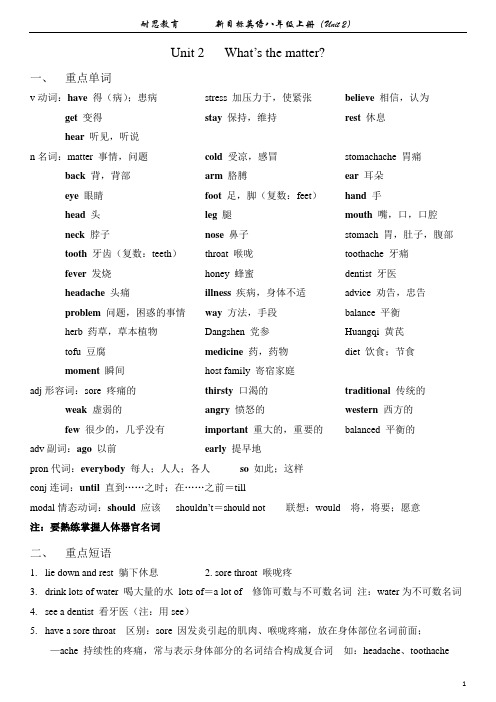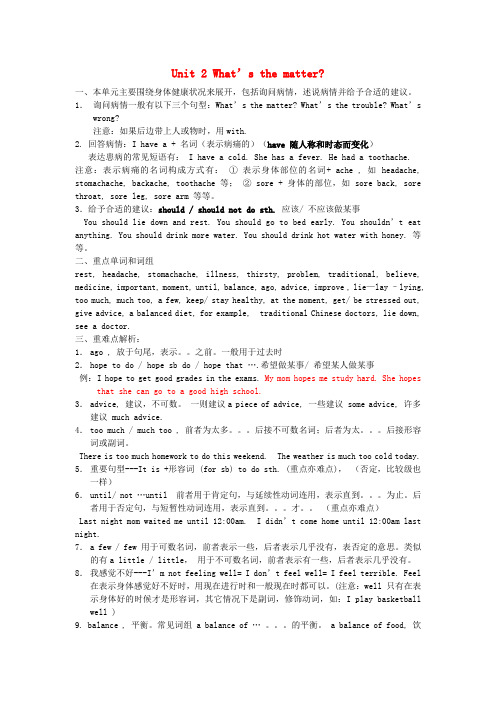人教新目标英语八年级上册Unit2知识点归纳整理
人教版新目标英语八年级上unit2知识点

Unit 2 How often do you exercise 一、词型转换Section A1.ever →(反义词) never2.shop →(如今分词) shopping3.full →(反义词) empty4.read →(pt.) readSection B→(v.)act1.active→(n.) activity2.health →(adj.) healthy →(反义词) unhealthy3.body →(pl.) bodies4.die →(pt.) died5.write →(n.表人) writer6.keep →(pt.) kept →(pp.) kept7.little →(比较级) less→(最高级) least8.though →(同义词) although二、短语归纳Section A1.how often 多久一次2.read English books 看英语书3.of course 当然4.on weekends 在周末5.go to the movies 去看电影6.hardly ever 几乎不;不曾7.every day 每天once a day 每天一次8.twice a week 每周两次three times a month 每月三次e the Internet 上网10.have dance and piano lessons 上舞蹈和钢琴课11.play tennis 打网球12.help with housework 扶植做家务13.at least 至少,不少于Section B1.junk food 垃圾食品2.drink milk 喝牛奶3.three or four times a week 一周三到四次4.eat fruit 吃水果5.want sb. to do sth. 想要某人做某事6.be good/bad for 对……有好处/害处7.go camping in the country 去乡下露营8.play sports 做运动9.one to three times a week 一周一至三次10.such as 例如11.fifteen percent of our students 我们百分之十五的学生12.go to the dentist 去看牙医13.more than 多于14.less than 少于重点句子1.how often do you exercise你多久熬炼一次2.—What do you usually do on weekends—周末你通常干什么?—I usually play soccer.—我通常踢足球。
人教版八年级上册英语unit2重难点知识点梳理扩展

人教版八年级上册unit2知识点梳理及拓展CONTENT本讲课程内容:八上《新目标》Unit 2 How often do you exercise?Part 1 vocabulary 高频单词短语Part 2 grammar 语法要点Part 3 exercise 真题训练Unit 2 How often do you exercise?Part 1 vocabulary高频单词短语1. Next week is quite full for me.●---Do you need some more cakes? ---No, thanks, I am full. 吃饱的●I really had a full week so I don’t want to go out today.忙碌的●He has been studying in the new school for a full year. 完整的,整个的●The glass is full of water.装满的词组积累:●full marks满分●live a full life过着充实的生活●be full of 充满2. She says it’s good for my health.●keep / be in good health 健康状况好●keep / be in bad / poor health 健康状况不好●keep healthy/ fit 保持健康● a healthy lifestyle健康的生活方式3. Here are the results.●His illness is the result of a car accident …的结果(后加原因)●He made one big mistake, and as a result, lost his job. 作为结果4. We think the best way to relax is through exercise.●prep.We got the news through him. 通过;以,凭借I tried to call you but I couldn't get through. (电话)接通He will not live through the night. 在整个期间,自始至终I didn’t get through the exams. 通过●adj.Are you through with the computer yet ? 完成(某事);用完(某物)I’m through with you ! 与(某人)关系完结5. and you can spend time with your friends and family as you play together.●conj.She doesn’t sing as well as her sister. 和…一样When in Rome,do as Romans do. 按照…的方式;如同As my mother isn’t at home,we have to eat out. 由于;因为As time goes on, we'll grow up. 随着;当…的时候众所周知as everyone knows / as far as we know●prep.Dad dressed up as Santa Claus. 作为5. Old habits die hard.●1)死;死亡The man died young, at the age of 27.死于die of hunger/cancer/illnessdie from an earthquake/ an accident●2)消亡;消失Our love will never die. 我们的爱始终不渝。
人教新目标八年级英语上册第二单元讲义(Unit 2 What's the matter)

Unit 2 What’s the matter?一、重点单词v动词:have得(病);患病stress 加压力于,使紧张believe相信,认为get变得stay保持,维持rest休息hear听见,听说n名词:matter 事情,问题cold受凉,感冒stomachache 胃痛back背,背部arm胳膊ear耳朵eye眼睛foot足,脚(复数:feet)hand手head头leg腿mouth嘴,口,口腔neck脖子nose鼻子stomach 胃,肚子,腹部tooth牙齿(复数:teeth)throat 喉咙toothache 牙痛fever发烧honey 蜂蜜dentist 牙医headache头痛illness疾病,身体不适advice 劝告,忠告problem问题,困惑的事情way方法,手段balance 平衡herb 药草,草本植物Dangshen 党参Huangqi 黄芪tofu 豆腐medicine药,药物diet 饮食;节食moment瞬间host family 寄宿家庭adj形容词:sore 疼痛的thirsty口渴的traditional传统的weak虚弱的angry愤怒的western西方的few很少的,几乎没有important重大的,重要的balanced 平衡的adv副词:ago以前early提早地pron代词:everybody每人;人人;各人so 如此;这样conj连词:until直到……之时;在……之前=tillmodal情态动词:should 应该shouldn’t=should not 联想:would 将,将要;愿意注:要熟练掌握人体器官名词二、重点短语1.lie down and rest 躺下休息2. sore throat 喉咙疼3.drink lots of water 喝大量的水lots of=a lot of 修饰可数与不可数名词注:water为不可数名词4.see a dentist 看牙医(注:用see)5.have a sore throat 区别:sore 因发炎引起的肌肉、喉咙疼痛,放在身体部位名词前面;—ache 持续性的疼痛,常与表示身体部分的名词结合构成复合词如:headache、toothachehave a cold 感冒have a headache/stomachache/toothache 头痛/胃痛/牙痛have a+名词表示患病的意思6.hot tea with honey 加蜂蜜的热茶7.eat something 吃一些东西否定句中用anything 例:You shouldn’t eat anything.8.feel well 感到舒服9. a good idea 一个好主意10.about a week ago 大约一个星期前11. I think so 我想是这样12.be stressed out 紧张的13. go to bed early 早点上床睡觉14.drink some water 喝一些水15. listen to music 听音乐16.traditional Chinese doctors 传统的中医17. for example 例如18.a balance of yin and yang 阴阳平衡19. eat hot yang foods 吃一些壮阳的食物20.Chinese medicine 中药21. be popular 受欢迎22.be weak/tired 虚弱/疲劳23. in many western countries 在许多的西方国家24.be easy to 很容易做某事25. have a healthy lifestyle 有一个健康的生活方式26.get tired 变得疲劳27. a few nights 几个晚上 a few+名词复数形式28.other healthy food 其他健康食品29. ask sb for advice 向某人征询建议30.give the best advice 给出最好的建议31. be important to…对……很重要32.sleep eight hours a night 一夜睡八个小时33. need to do sth 需要做某事34.get stressed out 变得紧张35. eat a balanced diet 均衡饮食36.stay/keep healthy 保持健康37. give you medicine 给你开药38.at the moment 现在39. have a lot of headaches 头很痛40.study late 学习很晚41. host family 寄宿家庭42.need some conversation practice 需要一些会话练习practice 不可数名词43.really nice 非常好44. too much 太多三、重点句型1.——What’s the matter with Gina?吉娜怎么了?——She’s tired. 她累了①tired 疲倦的它可以与be、feel、get、look搭配使用be tired 身体所处的状态feel tired 强调身体的感觉get tired 侧重身体的变化look tired 侧重视觉效果②What’s the matter? 询问别人的病情同义句:What’s wrong with you? What’s your trouble?③It doesn’t matter 一般用于回答对方的道歉,意思为没关系!2.I have a sore throat 我喉咙疼have 患(病)的意思have a+名词表示患有某种病症3.That’s a good idea. 那是个好主意4.Traditional Chinese doctors believe we need a balance of yin and yang to be healthy.传统中医认为阴阳平衡,这样才能健康。
八年级英语上册 unit 2 what’s the matter重难点解析 人教新目标版

Unit 2 What’s the matter?一、本单元主要围绕身体健康状况来展开,包括询问病情,述说病情并给予合适的建议。
1.询问病情一般有以下三个句型:What’s the matter? What’s the trouble? What’s wrong?注意:如果后边带上人或物时,用with.2. 回答病情:I have a + 名词(表示病痛的)(have 随人称和时态而变化)表达患病的常见短语有: I have a cold. She has a fever. He had a toothache. 注意:表示病痛的名词构成方式有:① 表示身体部位的名词+ ache , 如 headache, stomachache, backache, toothache 等;② sore + 身体的部位,如 sore back, sore throat, sore leg, sore arm 等等。
3.给予合适的建议:should / should not do sth.应该/ 不应该做某事You should lie down and rest. You should go t o bed early. You shouldn’t eat anything. You should drink more water. You should drink hot water with honey. 等等。
二、重点单词和词组rest, headache, stomachache, illness, thirsty, problem, traditional, believe, medicine, important, moment, until, balance, ago, advice, improve , lie—lay –lying, too much, much too, a few, keep/ stay healthy, at the moment, get/ be stressed out, give advice, a balanced diet, for example, traditional Chinese doctors, lie down, see a doctor.三、重难点解析:1.ago , 放于句尾,表示。
人教版新课标八年级上册英语Unit2知识点归纳

人教版新课标八年级上册英语Unit2知识点归纳人教版新课标八年级上册英语Unit 2知识点归纳Unit 2 hat’s the atter?【复习目标】●掌握身体各部位名称的英表达方式●能表述身体的种种不适以及对他人身体的种种不适给予适当的建议【语言目标】● hat’s the atter? I have a headahe.● yu shuld drink se tea. The sunds like a gd idea.● I have a sre bak. That’s t bad .● I hpe yu feel better sn.【重点词汇】● head, nse, eye, ear, tth, nek, stah, bak, leg, ar, ft, thrat● thirsty, stressed ut,/ dentist, lie, rest, hney, water, illness, advie.● ld, fever, headahe, tthahe, stahahe, sre thrat【应掌握的词组】1. Have a ld 感冒2. sre bak 背痛3. nek and nek 并驾齐驱,齐头并进4. I have a stahahe 我胃痛= I have gt a stahahe = There is sething wrng with y stah= y stah hurts = I have (gt) a pain in y stah5. hat’s the atter? 怎么了?= hat’s the truble (with yu)? = hat’s yur truble?= hat’s wrng (with yu)?= hat’ the atter (with yu)? =hat has happened t yu?= Is there anything wrng (with yu)? = what’s up?6. sre thrat 咽喉痛7. lie dwn and rest 躺下休息8. see a dentist 看牙医9. drink lts f water 多喝水10. ht tea with hney 加蜂蜜的热茶11.That’s a gd idea 好主意12.That’s t bad 太糟糕了13.I think s 我认为如此14. I’ nt feeling well. 我觉得不太舒服= I’ nt feeling fine/all right. = I’ feelingill/sik. =I feel terrible/bad.= I dn’t feel well.15. get se rest 多休息16. I have n idea = I dn’t knw 我不知道17. stressed ut 筋疲力尽18. I a tired 我累了 He is tired. 他累了19. a healthy lifestyle健康的生活方式20. traditinal hinese dtrs传统中医21. a balane f yin and yang阴阳调和22. yu have t uh yin.你阴气太盛23. t eat a balane diet饮食平衡24. healthy fd 健康食品25. stay healthy 保持健康=keep healthy=keep in gd health = keep fit26. eny neself (yself, yurself, herself, hiself, theselves, urselves, itself反身代词) 玩得高兴,过得愉快=have a gd tie = have a wnderful tie = have fun27. eny sth. =like sth. (名词)喜欢某物,eny ding sth.喜欢做某事=like ding sth pratie ding sth.练习做某事,ind ding sth. 介意做某事, finish ding sth.完成某事,give up ding sth.放弃做某事, an’t help ding sth.忍不住做某事,keep ding sth. 坚持做某事. (keep n ding sth. / keep sb. ding sth. )be busy ding sth. 忙着做某事 be used t ding sth.习惯于做某事ake a ntributin t ding sth.为..做贡献g n ding sth. 继续做某事 frget ding sth.忘记做过某事reeber ding sth. 记得做过某事 spend....(in) ding sth. 花(时间)做某事prefer ding sth.t ding sth.比起(做...)更愿意(做...)28. at the ent = nw 此刻29. Hst faily 东道家庭30. nversatin pratie会话练习31. I’ srry t hear that.听到此事我很难过【应掌握的句子】1. hat’s the atter? I have a bad ld. 你怎么了?我得了重感冒。
初中英语人教新目标八年级上册Unit2知识点整理

八年级英语上册Unit2知识点一、词汇与短语【重点单词】[A部分]1.housework n.家务劳动;家务事2.hardly adv.几乎不;几乎没有3.ever adv.在任何时候;从来;曾4.once adv. 一次;曾经5.twice adv.两次;两倍6.Internet n.(国际)互联网;因特网7.program n.节目8.full adj.忙的;满的;充满9.swing n.摆动;秋千 V. (使)摆动;摇摆10.maybe adv.大概;或许;可能11.least adv.最小;最少 adj. & pron.最小的;最少的[B部分]1.junk n.无用的东西;无价值的东西2.health n.健康;人的身体(或精神)状态3.result n.结果;后果4.percent n.百分之…5.online adj. & adp.在线(的);联网(的)6.although conj.虽然;尽管;即使7.through prep.以;凭借;穿过8.such adj. &pron.这样的;那样的;类似的9.mind n.头脑;心智10.together adv.在一起;共同11.die v.消失;灭亡;死亡12.dentist n.牙科医生13.magazine n.杂志;期刊14.however adv.然而;不过15.almost adv.几乎;差不多16.none pron.没有一个;毫无17.point n.得分;点 v.指;指向【重点短语】[A部分]1.how often 多久一次2.help with housework 帮助做家务3.hardly ever几乎从不4.on weekends 在周末5.once a week 每周一次6.twice a month 每月两次7.be free 有空8.go to the movies 去看电影e the Internet 用互联网10.have dance and piano lessons上舞蹈课和钢琴课11.swing dance 摇摆舞12.play tennis 打网球13.stay up late 熬夜;睡得很晚14.at least 至少;不少于;起码15.play sports 进行体育活动[B部分]1.junk food垃圾食品2.be good for 对…有好处3.go camping 去野营4.not … at all 一点儿也不5.go online 上网6.in one's free time 在某人的业余时间7.the best way to do sth. 做某事的最好方式8.such as例如;像这样9.more than 多于10.less than 少于【重点句子】[A部分]1.--What do you usually do on weekends?--I often go to the movies."在周末你通常做什么?”“我经常去看电影。
人教版新目标八年级英语上册1、2、3、4单元知识点总结

⼈教版新⽬标⼋年级英语上册1、2、3、4单元知识点总结新⽬标⼋年级英语上册第⼀单元Unit 1.How often do you exercise?I. 重点短语归纳:on weekends 在周末1. go to the movies 去看电影2. look after=take care of 照顾、照看3. surf the internet 上⽹4. healthy lifestyle 健康的⽣活⽅式5. go skateboarding 去滑滑板watch TV看电视6. keep healthy=stay healthy = keep in good health 保持健康keep + 形容词表保持某种状态do some reading 阅读7. exercise= take/do (much) exercise=do sports锻炼8. eating habits 饮⾷习惯9. take more exercise 做更多的运动10. the same as 与什么相同11. once a month⼀⽉⼀次12. be different from 不同13. twice a week⼀周两次.three times a week⼀周三次14. make a difference to 对什么有影响As teachers, you must believe that you can make a difference to the lives of your students. ⾝为教师,你们必须坚信你们能够影响学⽣的⼀⽣。
A false step will make a great difference to my future.错⾛⼀步对我的前程来说会产⽣很⼤影响。
15.how often 多久⼀次,询问动作发⽣的频率⼀般⽤once a week ,twicea month ,every day ,sometimes等回答。
新版新目标英语八上第二单元知识点

人教版八年级上册英语知识点Unit 2。
How often do you exercise?一.、重点短语归纳:1.go to the movies =go to the cinema去看电影2。
look after=take care of 照顾3。
surf the internet 上网4.healthy lifestyle 健康的生活方式5。
go skateboarding 去滑滑板watch TV看电视6。
keep healthy=stay healthy= keep in good health保持健康keep +形容词,“表保持某种状态”do some reading 阅读7.exercise= take/do (much)exercise=do sports锻炼8.eating habit 饮食习惯9。
take more exercise 做更多的运动10.be the same as 与什么相同11.once a month一月一次12。
be different from 不同13。
twice a week一周两次。
three times a week一周三次14。
make a difference to 对什么有影响如:As teachers,you must believe that you can make a difference to the lives of your students. 身为教师,你们必须坚信你们能够影响学生的一生。
如:A false step will make a great difference to my future。
错走一步对我的前程来说会产生很大影响.15。
how often 多久一次,询问动作发生的频率how many times 多少次,用来提问做某事的次数16。
although=though虽然〈不能与but连用〉17。
most of the students=most students大多数学生18。
- 1、下载文档前请自行甄别文档内容的完整性,平台不提供额外的编辑、内容补充、找答案等附加服务。
- 2、"仅部分预览"的文档,不可在线预览部分如存在完整性等问题,可反馈申请退款(可完整预览的文档不适用该条件!)。
- 3、如文档侵犯您的权益,请联系客服反馈,我们会尽快为您处理(人工客服工作时间:9:00-18:30)。
人教新目标英语八年级上册
Unit 2 How often do you exercise?
1.帮忙做家务
2.几乎不
3.在周末
在平时/在工作日
4.一周一次
一个月两次
一天三次
5.多久一次
怎么会?
6使用互联网
互联网的使用
7.熬夜
8.早睡
9.至少/起码
10. 锻炼新| 课|标| 第|一| 网
11吃健康的早餐
12.太忙了
13.对….有益
14.上舞蹈课和钢琴课
15 在。
的业余时间
16.课余活动
17.三四次
18.一至三次
19.多于
20.少于
21.例如
22. 看牙医
23. 向。
询问。
24.几次
25. 一点也不
26. 与。
一起度过时光
27.一个16岁的高中学生
28. 旧习难改。
29.。
怎么样?
30.通过做。
31. 想要某人做某事
32.做某事的最好的方式是。
33. (对。
来说)做。
是。
的
(形容词是事物的特点的用for sb,是人的品质特点的用of sb)It’s good to relax by using the Internet.
34. (总是---通常---经常----有时候---偶尔-从来没有)
35.百分之十五的学生
36.其余的(特定的,确定的范围)
37.去看牙医
38.别担心
39放松的最好方式
40快乐时光过得快
41; 我兴奋的听到这个令人兴奋的消息。
42.尽早做某事
Unit2 单词默写
n.家务劳动adv.几乎不;简直不;刚刚adv.曾经;在任何时候adv.一次;曾经
adv.两倍;两次n.因特网
n.节目;程序;课程;节目单adj.满的;充满的;完全的n.摇摆;秋千v.摇摆;旋转adv.或许;也许;可能
摇摆舞adj.最小的;最少的
至少
很少;几乎从不;难得
n.垃圾;废旧杂物
n.咖啡;咖啡色
n.健康;人的身体或精神状态
.结果;后果
adj.百分之...的
adj.在线的adv.在线地
n.电视机;电视节目
conj.虽然;尽管;然而;可是
prep.穿过;凭借;一直到
n.身体.头脑;想法;意见;心思adj.这样的;如此的
例如,像….这样
adv.共同;一起
v.死;枯竭;消失
n.作者;作家
n.牙科医生
n.杂志
adv.然而;无论如何;不管多么conj.比
adv.几乎;差不多
pron.没有人;没有任何东西,毫无adj.更少的;较少的
n.看法;要点;重点;小数点;目标;分数
n.垃圾食品;无营养食品
n超过;多于;
少于
Unit 2 How often do you exercise?
1.help with housework 帮忙做家务
2.hardly (ever) 几乎不
3.on/at weekends 在周末
on weekdays 在平时/在工作日
4.once a week 一周一次
twice a month 一个月两次
three times a day 一天三次
5.how often 多久一次
how come? 怎么会?
e the Internet 使用互联网
use of the Internet 互联网的使用
7.stay up late 熬夜
8.go to bed early 早睡
9.at least 至少/起码
10.play/have/do sports = take exercise 锻炼新| 课|标| 第|一| 网
11.eat a healthy breakfast 吃健康的早餐
12.(much) too busy 太忙了
13.be good for 对….有益
14.have/take dance and piano lessons 上舞蹈课和钢琴课
15.in one’s fr ee/spare time 在。
的业余时间
16.free time activities 课余活动
17.three or four times 三四次
18.one to three times 一至三次
19.more than = over 多于
20.less than 少于
21.such as (for example) 例如
22.go to the dentist = see the dentist 看牙医
23.ask sb about sth 向。
询问。
24.a few times 几次
25.not … at all 一点也不
26.spend time with sb 与。
一起度过时光
27.a 16-year-old high school student 一个16岁的高中学生
28.Old habits die hard. 旧习难改。
29. What/How about + doing sth ? 。
怎么样?
30.by + doing sth 通过做。
31. want sb to do sth 想要某人做某事
32.the best way to do sth 做某事的最好的方式是。
33.It’s + 形+(for/of)sb + to do sth (对。
来说)做。
是。
的
(形容词是事物的特点的用for sb,是人的品质特点的用of sb)
It’s good to relax by using the Internet.
34.always ---usually---often ----sometimes-----hardly ever----never(总是---通常---经常----有时候---偶尔-从来没有)
35. fifteen percent of the students 百分之十五的学生
36.the other 其余的(特定的,确定的范围)
37.go to the dentist=see the dentist 去看牙医
38. don’t worry 别担心
39 the best way to relax 放松的最好方式
40.pleasant time always goes fast 快乐时光过得快
41; I am excited to hear the exciting news. 我兴奋的听到这个令人兴奋的消息。
42.do sth before it’s too late 尽早做某事
Unit2 单词默写
n.家务劳动adv.几乎不;简直不;刚刚
adv.曾经;在任何时候adv.一次;曾经
adv.两倍;两次n.因特网
n.节目;程序;课程;节目单adj.满的;充满的;完全的
n.摇摆;秋千v.摇摆;旋转adv.或许;也许;可能
摇摆舞adj.最小的;最少的
至少
很少;几乎从不;难得
n.垃圾;废旧杂物
n.咖啡;咖啡色
n.健康;人的身体或精神状态
.结果;后果
adj.百分之...的
adj.在线的adv.在线地
n.电视机;电视节目
conj.虽然;尽管;然而;可是
prep.穿过;凭借;一直到
n.身体.头脑;想法;意见;心思adj.这样的;如此的
例如,像….这样
adv.共同;一起
v.死;枯竭;消失
n.作者;作家
n.牙科医生
n.杂志
adv.然而;无论如何;不管多么conj.比
adv.几乎;差不多
pron.没有人;没有任何东西,毫无adj.更少的;较少的
n.看法;要点;重点;小数点;目标;分数
n.垃圾食品;无营养食品
n超过;多于;
少于。
